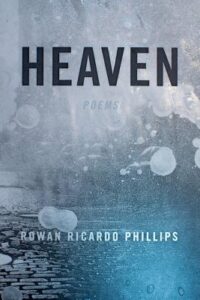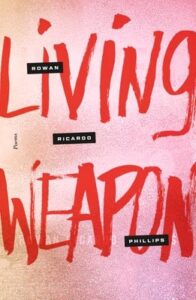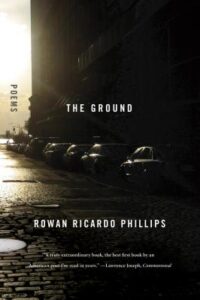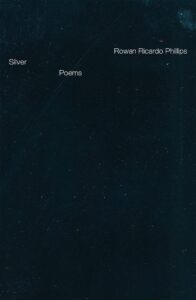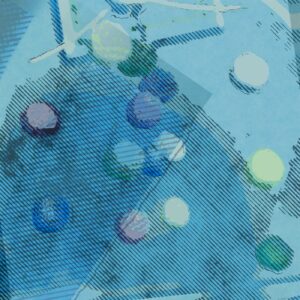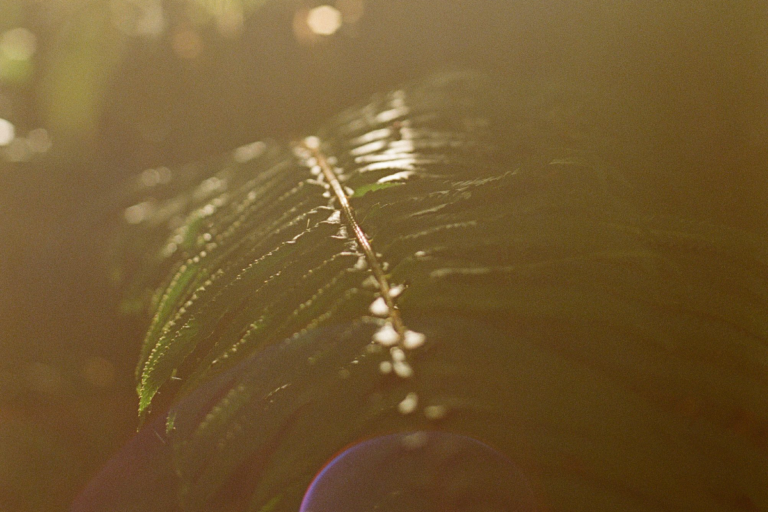Rowan Ricardo Phillips
Never Again Would Birds’ Song Be the Same
Have you ever had a private moment — perhaps in the middle of the night — in a large city? When it just seems like it’s you and the great dreaming metropolis? Rowan Ricardo Phillips brings us into a memory he can’t forget, complete with a Wu-Tang Clan soundtrack.
We’re pleased to offer Rowan Ricardo Phillips’s poem, and invite you to connect with Poetry Unbound throughout this season.
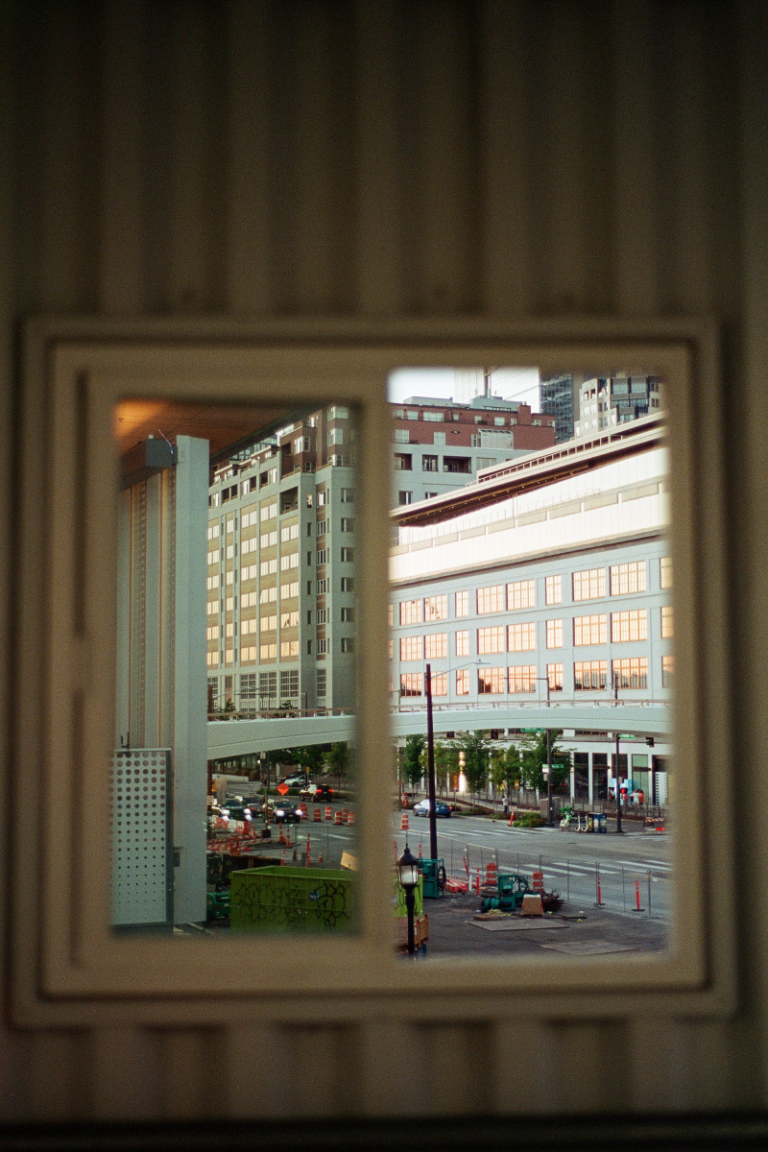
Image by Annisa Hale, © All Rights Reserved.
Guest
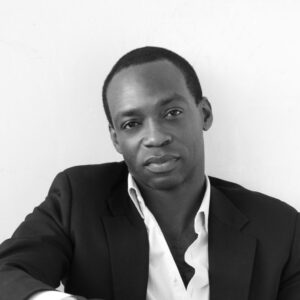
Rowan Ricardo Phillips is a highly acclaimed, multi-award-winning poet, author, screenwriter, academic, journalist, and translator. His poetry collections include The Ground (Farrar, Straus and Giroux, 2012), Heaven (2015), Living Weapon (2020), and the forthcoming Silver (2024). He is also the author of When Blackness Rhymes with Blackness (a new, forthcoming edition from Farrar, Straus and Giroux) and the nonfiction book The Circuit: A Tennis Odyssey (Picador, 2019). He has been the recipient of numerous awards and fellowships, including the Nicolás Guillén Outstanding Book Award, the Anisfield-Wolf Book Award, the PEN/ESPN Award for Literary Sports Writing, a fellowship from the John Simon Guggenheim Memorial Foundation, the PEN/Joyce Osterweil Award for Poetry, a Whiting Award, and the GLCA New Writers Award. Phillips is a regular contributor to The New York Times Magazine, the president of the board of the New York Institute of the Humanities, and the poetry editor of The New Republic. Phillips received his doctoral degree in English literature from Brown University.
Transcript
Transcription by Alletta Cooper
Pádraig Ó Tuama: My name is Pádraig Ó Tuama, and when I was 18, I moved to Dublin and lived there for five years. And late one night, a friend said to me, “Here, Janis Ian is playing a midnight gig at the Olympia in Dublin City Center tonight. Do you want to go? I’ve got two tickets.” I was delighted. I love Janis Ian. And so we went, and next year it’ll be 30 years since that happened. And whenever I walk by that street, that particular place where I saw Janis Ian, and I have a little moment of remembering that gig that night, that music, that brilliance.
[music: “Praise the Rain” by Gautam Srikishan]
“Never Again Would Birds’ Song Be the Same” by Rowan Ricardo Phillips
“Eight floors below our wide-open window
As early summer sang to early dawn
And no breeze blew, a car crouched idling
Under a red traffic light that had spent
Most of the night with nothing in sight but
The rare bus or cab. I only knew the car
Was there by the boom of its stereo,
That sudden sound stirring me from deep sleep;
Her face facing mine, my face lost in hers,
We’d slept like the lines of a villanelle:
Apart, together, woven into one.
Then I rose and went to the window (how,
For some reason, the mind can’t seem to rest
Until it’s seen what it’s heard and defines
It), and I looked out, and down, but the car
By then had already pulled away, no
Sight of it but for its dragontail of bass.
I still wonder if this really happened:
If it matters in the greater scheme of things;
Is a poem the wonder or the matter?
A little later we started our day:
Coffee, the paper, a shower; she asked,
As we Sunday relaxed, if I’d slept well;
She asked me what I was humming; I stopped.
Months passed, then years, and I still have that song
In my head, like a bees’ swarm burrowing
Through the skull and finding there my old self,
Which now feels as though it once knew and loved
The city more in that rare heavenly
Moment that it and I were one, just as
“Wu-Tang is here forever” cracked the dawn,
And swerving swallows raptured in Ol’ Dirty’s
Voice . . . yeah, Ol’ Dirty Bastard, aka
Dirt McGirt, aka Ason Unique,
ODB, the Specialist, the dead one.”
[music: “Dust of Summer” by Gautam Srikishan]
So this poem by Rowan Ricardo Phillips is in part a love poem and in part a poem about a city and a poem about poetry as well as a poem about literature and music and lament. There’s so many things all wrapped into the easy narrative of it. There’s so much hidden within it. It unfolds into itself.
So he’s woken nearing dawn time because what had been a pretty quiet street all night is suddenly aroused with noise because there’s a car that’s gone through that’s been blasting some music. He describes that the car has gone leaving a “dragontail” of music behind. The lyrics of the song that remained with him for months after, for years after it seems, the lyrics are: “Wu-Tang is here forever.”
And it’s somehow linked to Robert Frost as well. Because the title, “Never Again Would Birds’ Song Be the Same,” is a Robert Frost poem. And you see swallows toward the end of the poem. As the car has gone through, he’s imagining or remembering swallows “swerving swallows raptured in Ol’ Dirty’s / Voice.”
It’s a memory of a place, of an apartment, of a city, of loving a city. And the poem doesn’t define exactly what city it is. It’s an experience of solitude in the city, although not complete solitude. He’s looking out a window, and there’s somebody else in the bed who doesn’t seem to have woken. And of course, you know, there’s the eight floors below him. Other people sleeping or working, people on their way to work. All of the ways that there are such a population there, and yet in the midst of a population, there’s a kind of sweet solitude that happens in that late-night, just-before-dawn moment. All of these things are held together in a poem about a morning and being woken up and going to see a car leaving and leaving behind a melody that stayed with him for years.
[music: “ZigZag Heart” by Blue Dot Sessions]
One of the things that strikes me in this poem particularly is how one moment being woken up by the sound of music coming from a car that’s driving by your apartment window — or driving on the street eight floors below your apartment window — how that one moment totally forgettable as it is, can be a moment where so many of the interests of your life come together.
He describes himself getting up out of bed where they had been together, “her face facing mine, my face lost in hers, / We’d slept like the lines of a villanelle: / Apart, together, woven into one.” A villanelle is an Italian form of poetry where there’s two lines, the first and the third, and they keep on repeating over and over again at the end of the stanzas until the very, very final stanza where finally the two lines come together. And so he’s saying in a way that they were together and apart and crossing over and apart the whole way throughout the night. So this moment of the experience of waking up, he goes to poetry.
And there’s a lot of alliteration at the start of this poem. “Wide-open window,” “summer sang,” “breeze blew,” “car crouched,” “sudden sound stirring,” “face facing.” Rowan Ricardo Phillips uses a lot of poetic techniques the whole way throughout his poetry, brilliantly making reference to old styles of poetry, like a villanelle, and also contemporary art as well, like Wu-Tang Clan at the end of this poem. And I was wondering what the function of the alliteration is at the start of this. And this is a complete projection, but I’ve always loved his name, Rowan Ricardo Phillips. His name, too, is alliterative. And in a certain sense, I hear in the alliteration an echo of himself that this is a poem about him being him: alone in a room, looking out with some fairly forgettable moment. “If it matters,” he wonders, “in the greater scheme of things.” But somehow the exploration of a poem, a small anecdotal moment, is also an exploration of the self.
[music: “First Grief, First Air” by Gautam Srikishan]
Sometimes something happens in the world and people will all compare: Where were you and what were you doing when you heard the news or just before you heard the news? You know, I was looking out the window. I was making a cup of tea. I was on my way to work. I was trying to wake someone up. I was trying to stay asleep. Whatever it is that happens. And in a certain sense, this poem is a lament for Ol’ Dirty Bastard of Wu-Tang Clan and thinking, here’s a memory that he had of that music that’s still alive and the him that was listening to it. So this could be a way of keeping his relationship with that music alive.
But it also could just be a thing to say, “Where were you when that music went by that morning?” A very, very local experience. Maybe only for the people who would’ve heard it, whoever else was woken up by the sound of that car going by playing that music loudly. It doesn’t have to be a world-shattering event, and I don’t think it is. I think this is turning to a small moment and thinking, “I want to remember that.” Because the small moment is a container for so much that’s important to him. Music and poetry and that relationship and that city.
[music: “The Willows” by Gautam Srikishan]
“Never Again Would Birds’ Song Be the Same” by Rowan Ricardo Phillips
“Eight floors below our wide-open window
As early summer sang to early dawn
And no breeze blew, a car crouched idling
Under a red traffic light that had spent
Most of the night with nothing in sight but
The rare bus or cab. I only knew the car
Was there by the boom of its stereo,
That sudden sound stirring me from deep sleep;
Her face facing mine, my face lost in hers,
We’d slept like the lines of a villanelle:
Apart, together, woven into one.
Then I rose and went to the window (how,
For some reason, the mind can’t seem to rest
Until it’s seen what it’s heard and defines
It), and I looked out, and down, but the car
By then had already pulled away, no
Sight of it but for its dragontail of bass.
I still wonder if this really happened:
If it matters in the greater scheme of things;
Is a poem the wonder or the matter?
A little later we started our day:
Coffee, the paper, a shower; she asked,
As we Sunday relaxed, if I’d slept well;
She asked me what I was humming; I stopped.
Months passed, then years, and I still have that song
In my head, like a bees’ swarm burrowing
Through the skull and finding there my old self,
Which now feels as though it once knew and loved
The city more in that rare heavenly
Moment that it and I were one, just as
“Wu-Tang is here forever” cracked the dawn,
And swerving swallows raptured in Ol’ Dirty’s
Voice . . . yeah, Ol’ Dirty Bastard, aka
Dirt McGirt, aka Ason Unique,
ODB, the Specialist, the dead one.”
[music: “Praise the Rain” by Gautam Srikishan]
Chris Heagle: “Never Again Would Birds’ Song Be the Same” comes from Rowan Ricardo Phillips’s book, Heaven. Thanks to Farrar, Straus and Giroux who gave us permission to use Rowan’s poem. Read it on our website at onbeing.org.
[music: “Praise the Rain” by Gautam Srikishan]
Poetry Unbound is: Gautam Srikishan, Eddie Gonzalez, Lilian Vo, Lucas Johnson, Amy Chatelaine, Kayla Edwards, and me, Chris Heagle.
Our music is composed and provided by Gautam Srikishan and Blue Dot Sessions.
This podcast is produced by On Being Studios, which is located on Dakota land. Open your world to poetry with us by subscribing to our Substack newsletter. You may also enjoy Pádraig’s new book, Poetry Unbound: 50 Poems to Open Your World. For links and to find out more visit poetryunbound.org.
Books & Music
Recommended Reading
The On Being Project is an affiliate partner of Bookshop.org and Amazon.com. Any earnings we receive through these affiliate partnerships go into directly supporting The On Being Project.





